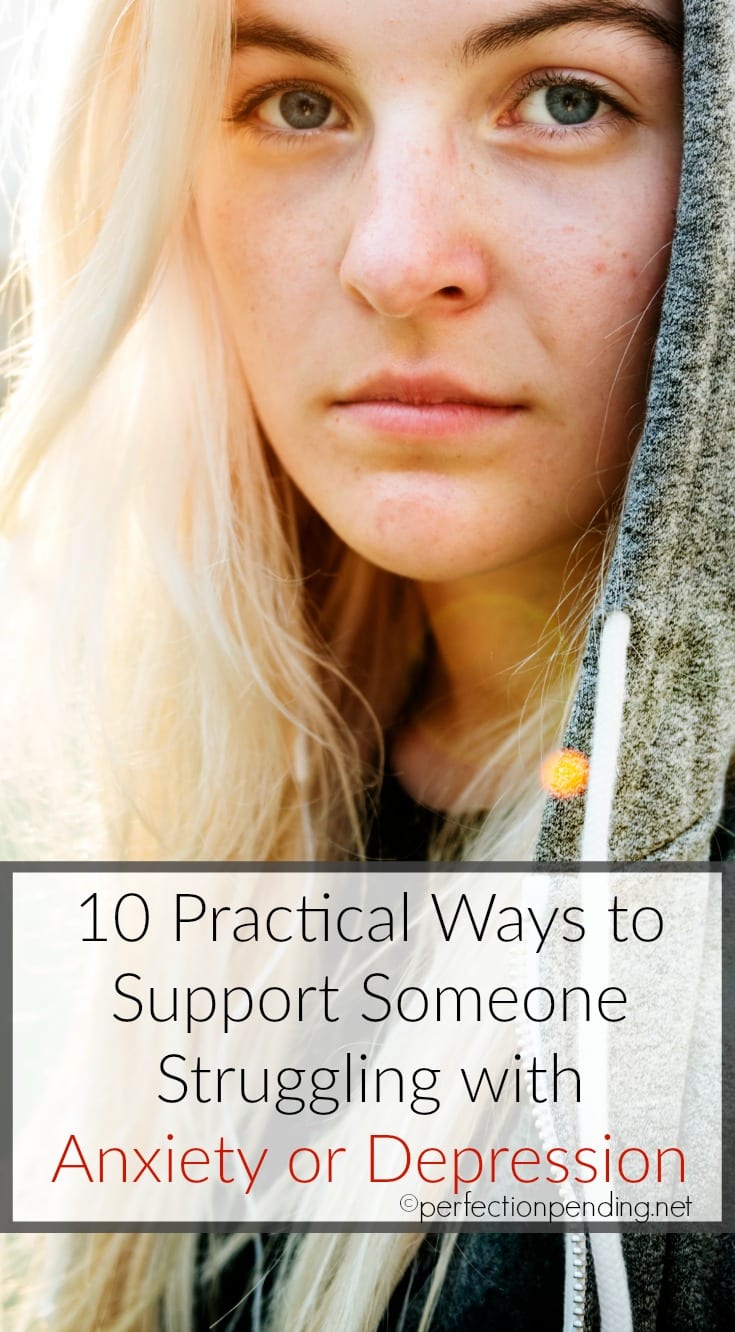Anxiety is something that is not always comfortable to write about, but it’s a big part of my life. A few years ago, I was blogging about it a lot. And, I felt very vulnerable. And, some people in my life were very supportive, while others weren’t. It felt freeing to write about it, but at the same time, it opened me up to my worst nightmare. Criticism. I was not in a place emotionally to be able to handle those things, but I’ve come a long way since then.
The thing I needed most during that very difficult year was support. I didn’t always get it. But, I realized that some people just probably don’t have a ton of experiencing interacting with someone that is suffering from anxiety or depression. Perhaps they feel helpless, or awkward, and all they can seem to muster up is advice and their perspective on what that person should do. And, the result often backfires. The person who suffers from anxiety and depression feels misunderstood, and the one trying to give advice feels frustrated. Sound familiar?
For me, advice about changing my attitude or just focusing on the positive didn’t help. If it was that easy for me, I would have done it. I just wanted to feel loved, not judged. And, most of all, I just wanted to feel supported. One thing I hope everyone will take away is that you can be supportive without making suggestions or pointing out the obvious.
Here’s what NOT to do:
Don’t point out that someone “might be depressed” or that they might “have a chemical imbalance.”
Those are definitely things NOT to say. The truth is, most people who have ever suffered from depression, or anxiety, or stress know that they are suffering from depression, anxiety, or stress. That’s why they call it “suffering.”
Don’t talk about their issues with other people.
Don’t talk about it with them if you are not super close.
If you are a casual acquaintance and they’re not opening up to you about it on their own, things might be better left unsaid. (Unless you are afraid that they will hurt themselves or others.) If you aren’t close, it will definitely be awkward if you try.
So what SHOULD you do? Here are 10 Ways to show support for someone struggling with anxiety or depression:

1. A Phone Call to Just Say Hello.
2. Offer to babysit.
3. Take them out to do something fun.
4. Simply ask: “Are you OK?” Maybe they will say, “I’m fine” and you know they’re not. Here’s a hint: that’s code for, “I don’t want to talk about it.” Maybe they don’t want to talk about it in that moment. Maybe they just don’t want to talk about it with you. Maybe they just don’t want to talk about it with anyone. Don’t press the issue. Ask again another time if you think things are not getting better, but if they still refuse to talk? There is probably a reason. Unless you think they’re suicidal or abusing drugs (which isn’t always the case with people suffering from anxiety or depression), just leave it alone.
5. Show affection. Give them a hug, or even just an arm over a shoulder, and tell them something generic like, “I’m not sure what’s going on, but I hope things get better soon”. Nothing else needs to be said.
6. Bring their favorite treat. For me, it would be a large diet coke and a box of chocolate. That will always make me feel loved.
7. Encourage. Write a note, send a text, or an email telling them one thing you admire about them. Building someone up is a far better alternative than suggesting things they can fix.
8. Talk about the person struggling, not yourself all the time. Show interest in their life outside of whatever they might be struggling with. Show that you care, and they might trust you more to open up later.
9. Do something that is out of your comfort zone. Stop worrying about whether it will be uncomfortable for you, and reach out to do something that you might not normally do.
10. Say, “That must be so hard” and nothing else. Don’t tell them to count their blessings. When someone is feeling depressed or anxious, that might make them feel guilty that they aren’t seeing the beauty in the world around them.
Mental health issues are invisible to the outsider, so it is difficult for those of us that “suffer” to talk about them. You may think we need to just pull up our bootstraps and cope, while we feel like it’s entirely out of our control.
I’m grateful to be surrounded by mostly loving and supportive people in my life. But, there are still many people that don’t realize I struggle with anxiety on a regular basis or refuse to take the time to understand what I deal with. If you want to be supportive, the thing your friend needs the most is love, friendship, and most importantly, non-judgment.





This is a great list. I used to struggle with depression in high school, and I didn’t need someone to “fix me” or give me sympathy. I just needed someone to treat me normally so I could feel normal too. In fact, I still don’t even talk to the people who were my best friends then, because I couldn’t get past who I was when they continually saw me that same way.
And don’t feel bad talking about it. People can’t support you if they don’t know. And know they know how!
I definitely don’t feel bad talking about it. But, it feels vulnerable. That can be scary. 🙂 But, I feel like I’m more prepared to handle talking about it now. Even if it makes those around me uncomfortable.
Thank you for sharing your story & I like the list. As someone who suffers from anxiety/depression, I totally agree.
This is a great list and I think that these are things you could do to show support to anyone, especially if they seem to be having a difficult time, whether you know they suffer from depression or anxiety or not. Thanks for sharing & for linking up with the Been There Done That hop!
I totally agree! I think being supportive just basically boils down to being a good friend.
Hi!
So strange – today of all days, I decided to just go for it and blog about my depression. I took a big risk. A few trusted blogger friends thought it might give me relief. But it definitely left me feeling a little exposed.
So, hey! Your anxiety must be hard. I’m glad I could listen.
xo,
Samara
I’d love to read it. The thing is, it is hard to be vulnerable and share something so personal. But, I received a lot of support. What hurts is the one person that doesn’t know how to be supportive or that says something hurtful. Opening up yourself is cathartic. At least for me anyway.
Thank you so much for sharing your story.
I’m deeply touched, I get depressed every once and a while and I also have these random tragic thoughts about myself or my family.
Its nice to know that I’m not the only way who has these kinds of thoughts. Keep doing what you’re doing and don’t let others get you down. I’m stopping by from the Been There Done That Blog Hop to say Hi!! 🙂
Thanks so much for stopping by!!
Great post. I know exactly how you feel. I once had a boyfriend who had no clue what it was all about and asked me why I wasn’t fixed since meeting him and being in a happy relationship *sigh*
How annoying!
Thank you for sharing this. Nobody can really be in your shoes, but by writing about it, you are helping others understand what it’s like. Keep on blogging!
Thanks!!
I have anxiety too and always have plans in place when I travel…just in case I die in a plane crash, a car crash, a freak accident, whatever! So, I really relate. Somehow getting things in order makes me feel better even though it’s a false sense of control and nothing will likely happen.
I love this list. I think it’s really helpful. I am going to think about my interactions with people I know are struggling (with anything) and try to be more mindful about what I say to them.
Thanks Lillian! I know, it’s kind of pointless to try to control something that you can’t, but I think that’s part of having anxiety! Thanks for stopping by!
Gosh this post has hit home with me so much. I have so many nights like that. Just last night I started to worry about my older son who struggles a little bit with some anxiety. I even asked my husband who said “don’t worry about it”. So easy for him to say!! I wonder just how many other mothers do this. Has anyone ever met a mother who never once had a worry like this? I can’t imagine it! I wonder how much of being a caring and loving mother includes this inevitable anxiety? Is there anyone who can’t relate at all to this kind of anxiety? Great post Meredith. Thank you for putting your heart out there once again!
I think there ARE Michelle! I run into so many people that just say things like, “You can’t control it, so why worry about it” which is of course obviously true, but STILL! There are moms out there that worry, but I don’t think all of them take it to the worry level that I do!
Hi Meredith,
That is such a great post! I know it is hard for anyone that has never suffered from Anxiety, Depression or Panic Attacks to truly be able to relate, but it would be so great if posts like this were required reading! The worst is hearing comments like “there is nothing you can do about it, so just forget about it”. Gee, don’t you think I would if I could?!
As someone that suffered from anxiety and panic attacks for almost 2 years straight, I can certainly relate and am sorry that you continue to go through that from time to time. Luckily I was able to eliminate the panic attacks and anxiety symptoms, but that overactive brain will always be something I’ll have to contend with I’m sure.
Thanks for sharing and being so open.
THanks for stopping by Jess! My anxiety has gotten a LOT better, but during times of high stress, it tends to sneak up on me again.
Good morning, Meredith! I wanted to let you know you are featured as one of the top three most viewed during the link up! Here is the link: http://redoityourselfinspirations.blogspot.com/2014/03/featured-posts-of-been-there-done-that.html Thank you for sharing with us at Been There Done That. Have a great weekend 🙂
Oh that’s awesome!! Thanks for letting me play along! 🙂 I’ll be back hopefully.
I agree, I simple Hello would sound very basic but at least it’ll give them a little comfort that might result to their recovery.
Just came upon your blog in the list for Blog for Mental health 2014. Enjoyed your post. Hope you keep on Blogging. David at counselorssoapbox
Thanks for sharing. These made me love and it gave me a little comfort that someone out there can relate and I am not alone with my depression.
Thanks for your story, sometimes people don’t understand situation of depressive person…. who suffers only knows what they are feeling and going through. Most of the time people shows their judgements only , rather understanding